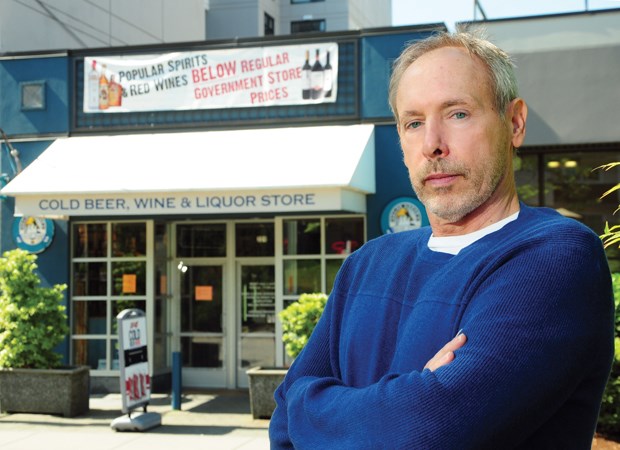A controversy is brewing in the wake of new changes to B.C.’s liquor legislation, with local private store operators claiming they’re being squeezed out of business by government stores that now offer the same convenience and lower prices.
Brian Riedlinger, co-owner of Sailor Hagar’s Brewpub and Liquor Store, has seen his sales dive since the new liquor rules came into effect April 1. He points to the government store on Esplanade — one block from his business — which is now open Sundays and holidays, and will soon introduce refrigerated wine and beer.
While the extended hours is good news for consumers, it’s killing business for family-owned and operated shops such as Sailor Hagar’s which has been in the community for 29 years, says Riedlinger. “My market was, we were the convenience store — and the government is trying to take the convenience market away from me.”
This past Easter weekend, when public liquor stores began opening on holidays, was the first real indication of how the new rules would impact B.C.’s liquor landscape. Riedlinger reported that his sales were down 40 per cent on Good Friday, when compared to the same day last year.
Overall, Sailor Hagar’s saw a 25 per cent decline in Sunday sales during April, again compared to same period last year.
Under the new rules, the government says it’s leveled the playing field by having B.C. Liquor Stores pay same wholesale prices on product as private operators.
However, the wholesale costs increased after the changes came into effect, said Riedlinger, but the government is only marking up on average by 16 per cent which he figures is not sustainable.
“So we can’t compete with them on price,” said Riedlinger.
It’s the same story in Lynn Valley where, with a government liquor store in the mall across the street, Imroz Rupani, owner of the North Shore Liquor Shop, says he is struggling to stay in business.
April was a tough month financially for Rupani’s family who took over the shop in 2012. Business was down 43 per cent on Good Friday and 37 per cent on Easter Monday, compared to last year. With Rupani’s Sunday sales also declining, he doesn’t know how much longer the business can carry on this way.
“We invested all our family savings in this and the rules were changed without any notice. We were told this industry is going to be protected — and it’s clearly not the case.”
Both Riedlinger and Rupani have contacted government officials to voice their concerns with the new liquor rules, including North Vancouver MLA Naomi Yamamoto, who is the Minister of State for Tourism and Small Business. They have yet to hear a response. At press time, Yamamoto had not returned the North Shore News’ calls.
B.C. Attorney General Suzanne Anton’s office sent a statement by email to the North Shore News that said the new rules are designed to increase competition in the market, which will benefit consumers.
“BC Liquor Stores are now expected to compete with private liquor retailers — and as such, have been given a more equitable set of rules to follow — placing them at the same starting line as their competitors,” said Anton in the statement.
NDP liquor policy critic David Eby said the government stores are not operating on a financially sustainable model.
The government commissioned a report by accounting firm Ernst & Young to explore what impacts the new liquor changes might have. Eby has asked Anton for a copy of that document, but has been denied that request. He also filed a Freedom of Information request.
Eby said without full transparency, the public is left to speculate about the government’s plans, which could be anything from getting out of the business of retailing liquor to driving small operators out of the industry and selling their licences to large grocery chains.
Eby, who sympathizes with small liquor business owners, says the government has a responsibility to address their concerns.
“They are really causing a lot of grief, and in some cases damage to family businesses,” said Eby.
As for the Ernst & Young report on B.C.’s liquor landscape, Anton said, in an email, it contains sensitive information related to revenue and profit margins — where disclosure would be detrimental to a third-party, business or a public body, if released.
Note: This story has been modified since first posted.



